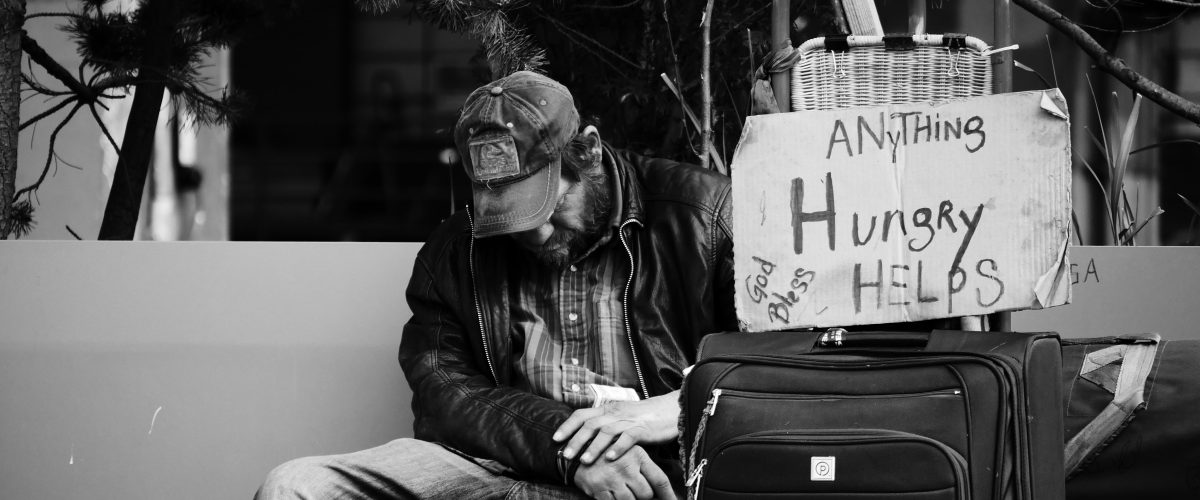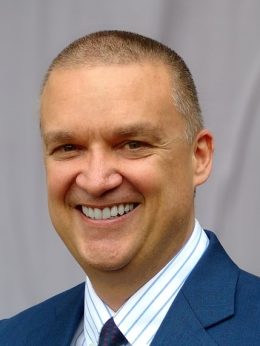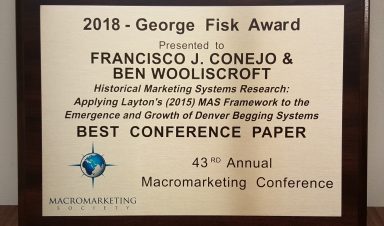
Unresolved issues around begging exist in almost every city around the world. CU Denver Business School Senior Instructor Francisco Conejo was walking down 16th Street in Denver when he was personally confronted with it. As a researcher, he decided to use his expertise in macromarketing to advance the literature around begging, specifically identifying the structural origins of begging in Denver.
Conejo’s paper is titled “Historical Marketing Systems Research: Applying Layton’s (2015) MAS Framework to the Emergence and Growth of Denver Begging Systems” and was co-authored by Professor Ben Wooliscroft from the University of Otago in New Zealand.
In the paper, he explores beggars and their relationship with the world through a macromarketing lens. Earlier this year, they presented the paper and accepted the prestigious 2018 George Fisk Macromarketing Award for the best paper of the 2018 Macromarketing Conference held in Leipzig, Germany.
Understanding begging as a macromarketer

Most marketing is conventionally known as micromarketing, or marketing as it relates to a company. Traditionally, marketing research isolates a single variable and studies it. Macromarketing, on the other hand, looks at the various interactions between marketing and society to attain a richer picture of how different variables interact.
In a way, macromarketing literature more closely models reality, because variables don’t exist in a vacuum. Conejo expanded, “Macromarketing studies the interrelationships with sustainability, social justice, and all these other areas that are fundamental for businesses to exist.”
For a number of years, macromarketing scholars have been looking deeper into unconventional topics. The way in which beggars emerged, by-product of our market system, is the exact kind of unconventional topics that a macromarketer would love to explore.
An ongoing societal issue
Conejo’s research focused on better understanding the begging problem currently afflicting cities around the world by using the emergence and growth of begging in Denver as a case study.
To better understand the present, Conejo believes we first need to understand our past. This paper provides the necessary historical background for his future research. Begging has long been a problem in Denver, so Conejo analyzed newspapers from 1859-1880, back during Denver’s early years as a mining camp, to fully grasp begging’s historic emergence in the city.
He said that this research goes beyond begging and relates to other current problems. Conejo noted how begging was portrayed throughout that time period. Issues of immigration, education, and social support were connected to begging. Interestingly, these related issues are still divisive topics in today’s media coverage and most likely still affect the begging culture. Even though times have changed dramatically, these issues remain unresolved 150 years later.
Insight to help shape public policy
“Begging is a complex societal problem that cannot be resolved through isolated efforts,” Conejo said. It has economic, social, psychological, and political aspects that all have to be considered in conjunction with each other. It’s easy to fall back on the overly simplistic view that begging is the result of just not wanting to work. Conejo’s research counters that narrative by providing a deeper understanding to the variables at play and how they interact with each other.
Conejo hopes that this kind of research can help shape public policy.
The impact: A tangible framework
Conejo’s research was so well-received because of its combination of both the system’s perspective and the historical research. Its methodology can now be used by other researchers to understand similar problems in their own respective cities.
Layton’s Mechanism, Action, Structure (MAS) systems framework is highly respected in the field, but had mostly been connected to theoretical research. Layton’s theory was developed to explain causal processes that influence how marketing systems emerge, grow, and adapt. Macromarketing’s focus on society gave Conejo a way to apply these tenets to something tangible.
By gaining insights as to when, how, and why begging emerged in Denver, city officials and other stakeholders will be better able to resolve the problem. Through continued research, Conejo hopes to create richer discussion around begging and homelessness in cities, so that the reasons behind the perpetuation of it can be identified. This research can then inform the policymakers and organizations who are actively working to drive positive change.
Further research on begging culture
For Conejo, the next few months will be focused on publishing his research in the Journal of Macromarketing. Now that he has established the historical causes of the begging culture, he can begin tackling what begging looks like today.

It’s important to Conejo to look at marketing from a systems perspective. He emphasizes that “marketing doesn’t operate in isolation.” He uses the metaphor of selling a water bottle. To truly understand the complexities of a product beyond the cost of the materials and labor, he challenges his students to consider where that water was coming from, where the empty bottle is going, and if both are sustainable in the long term. These are the kinds of externalities that people don’t typically consider.
Giving back to the community
Conejo believes, “It’s in our own self-interest to contemplate the macro aspects of whatever business model you’re pursuing. Long-term sustainability hinges on considering the environment, social justice, and other issues.”
He is inspired to do research that matters by giving back to the community we live in. “The CU Denver Business School is integrating its research with the realities of the city that hosts it. So, if we’re giving something back to the community, then we’re helping to improve Denver,” He shared. “It’s not only about the pursuit of theory for theory’s sake. It’s about developing theory for practical applications to actually improve the environment our school operates in.”


